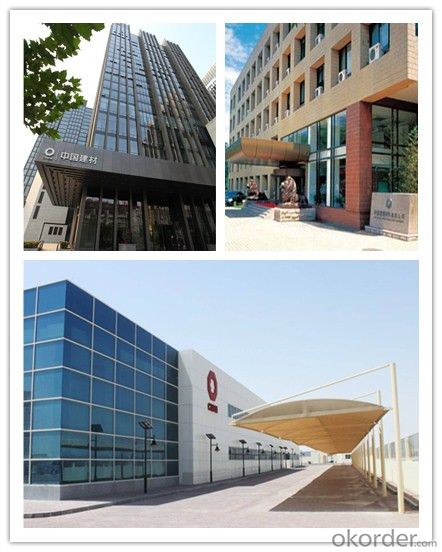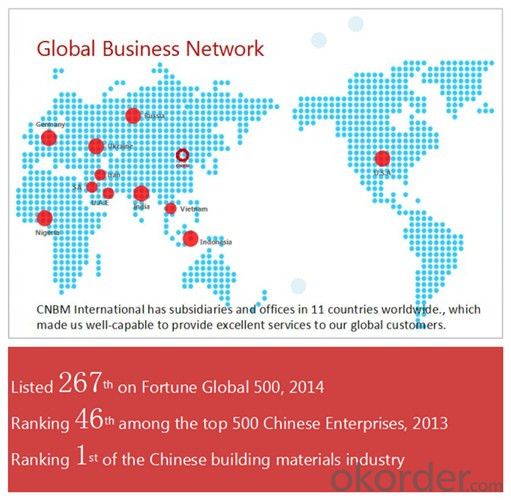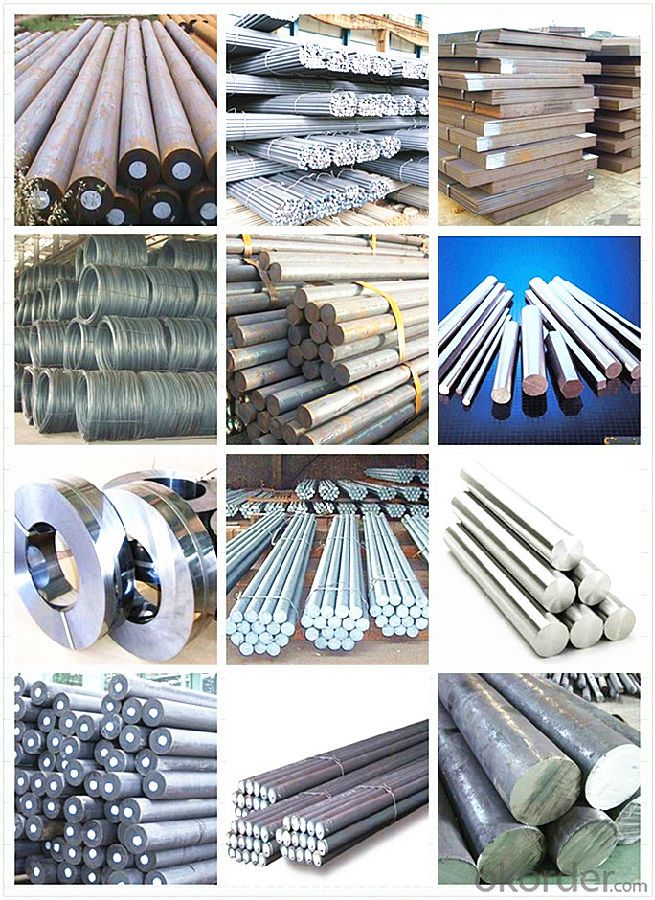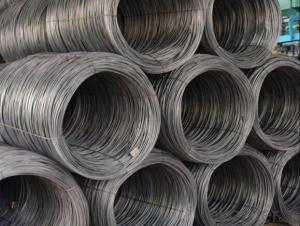Grade SAE1008B/1012B/1018B/1022B Hot Rolled Steel Wire Rod in Coils
- Loading Port:
- Tianjin
- Payment Terms:
- TT OR LC
- Min Order Qty:
- 3 m.t.
- Supply Capability:
- 10000 m.t./month
OKorder Service Pledge
Quality Product, Order Online Tracking, Timely Delivery
OKorder Financial Service
Credit Rating, Credit Services, Credit Purchasing
You Might Also Like
Item specifice
Type:
Carbon Steel,Spring Steel,Bearing Steel,Gear Steel,Deformed Steel,Stainless Steel,Alloy Steel
Shape:
Steel Coil,Steel Sheet,Steel Wire Rod,Steel Flat Bar,Steel Square Bar,Steel Angle,Steel Round Bar,Steel Billets
Technique:
Hot Rolled,Cold Rolled,Cold Drawn,ERW,Forged,Saw,Extruded,EFW,Spring
Surface Treatment:
Galvanized,Coated,Copper Coated,Color Coated,Oiled,Dry,Chromed Passivation,Polished,Bright,Black,PVDF Coated
Certification:
ISO,SGS,BV,IBR,RoHS,CE,API,BSI,UL
Thickness:
6.5mm-12mm
Width:
6.5mm-12mm
Length:
In coils
Outer Diameter:
6.5mm-12mm
Net Weight:
2m.t.
Packaging:
Seaworthy packaging
Grade SAE1008B/1012B/1018B/1022B Hot Rolled Steel Wire Rod in Coils
Detailed Information of the Grade SAE1008B/1012B/1018B/1022B Hot Rolled Steel Wire Rod in Coils
| Name | Hot Rolled High Carbon Wire Rod |
| Shape | Round Bar/Square Bar/Flat Bar/Plate/Wire |
| Standard | GB/ASTM/SAE/AISI/DIN/JIS/EN/BS |
| Surface Treatment: | Black/Peeling/Polished/Machined |
| Delivery Condition: | Hot Rolled or Forged/Peeled or Black Surface |
| Test | SGS/UT 100% Elements Testing |
| Certificate: | ISO/Mill Certificate |
| Service: | 24 hours online service / |
| more than 20 years trading and manufacture | |
| Quality Assurance: | the third party inspection, such as SGS, BV, TUV…etc. is acceptable |
| Packaging Details: | Seaworthy Packaging or as per customer's packing instruction |
Chemical Composition of the Grade Grade SAE1008B/1012B/1018B/1022B Hot Rolled Steel Wire Rod in Coils
| Grade | Chemical Composition(%) | |||||
| C | Mn | Si | S | P | B | |
| SAE1008 | 0.1max. | 0.3~0.50 | 0.15max | 0.050max | ≤0.040 | >0.0008 |
| Mechanical properties | ||||||
| Yield strength(N/mm2) | Tensile strength(N/mm2) | Elongation(%) | ||||
| 250-280 | 350-380 | ≥32 | ||||
Company Introduction the Grade Grade SAE1008B/1012B/1018B/1022B Hot Rolled Steel Wire Rod in Coils
CNBM International Corporation is the most import and export platform of CNBM group(China National Building Material Group Corporation) ,which is a state-owned enterprise, ranked in 270th of Fortune Global 500 in 2015.
With its advantages, CNBM International are mainly concentrate on Cement, Glass, Iron and Steel, Ceramics industries and devotes herself for supplying high quality series of refractories as well as technical consultancies and logistics solution.


| After-sale service | CNBM provides the services and support you need for every step of our cooperation. We’re the business partners you can trust; you can relax and get on with doing business. |
| For any problem, please kindly contact us at any your convenient time, we’ll reply you in our first priority within 24 hours | |
| Advantages | Industry experience over 20 years. |
| Shipment of goods -More than 70 countries worldwide. | |
| The most convenient transport and prompt delivery. | |
| Competitive price with best service. | |
| High technical production line with top quality products. | |
| High reputation based on best quality products. |
Packaging & Delivery the Grade SAE1008B/1012B/1018B/1022B Hot Rolled Steel Wire Rod in Coils
| Packaging Detail | Sea worthy packing /as per customer's packing instruction |
| Delivery Detail | 15 ~ 40 days after receiving the deposit |
Products Show

FAQ:
| Are you a trader or manufacturer? | Manufacturer |
| What’s the MOQ? | 3 metric ton |
| What’s your delivery time? | 15-35 days after downpayment received |
| Do you Accept OEM service? | Yes |
| what’s your delivery terms? | FOB/CFR/CIF |
| What's the Payment Terms? | 30% as deposit,70% before shipment by T/T |
| Western Union acceptable for small amount. | |
| L/C acceptable for large amount. | |
| Scrow ,Paybal,Alipay are also ok | |
| Why choose us? | Chose happens because of quality, then price, We can give you both. |
| Additionally, we can also offer professional products inquiry, products knowledge train (for agents), smooth goods delivery, excellent customer solution proposals. | |
| What's your available port of Shipment? | Main Port, China |
| What’s your featured services? | Our service formula: good quality+ good price+ good service=customer's trust |
| Where are your Market? | Covering more than 160 countries in the world |
- Q:What are the applications of special steel in the manufacturing supply chain?
- Special steel has various applications in the manufacturing supply chain. It is commonly used in industries such as automotive, aerospace, energy, and construction. Special steel's unique properties, including high strength, durability, and resistance to corrosion and wear, make it ideal for manufacturing components and parts that require exceptional performance under demanding conditions. These applications can range from manufacturing engine components, structural parts, tools, and machinery, to oil and gas pipelines, power generation equipment, and building infrastructure. Special steel plays a crucial role in enhancing the overall efficiency, reliability, and safety of the manufacturing supply chain.
- Q:Can special steel be used in the nuclear industry?
- Yes, special steel can be used in the nuclear industry. Special steel is often chosen for its high strength, corrosion resistance, and ability to withstand extreme temperatures and radiation. It is commonly used in the construction of nuclear reactors, containment vessels, and fuel storage systems. The specific requirements and standards for special steel used in the nuclear industry are carefully regulated to ensure safety and reliability.
- Q:What are the different surface finishing methods used for special steel?
- Special steel can be subjected to various surface finishing methods, each serving a distinct purpose and yielding different outcomes. The most commonly employed surface finishing techniques for special steel comprise: 1. Grinding: By utilizing abrasive materials, grinding eliminates excessive material from the steel's surface. This method is primarily employed to attain a polished and sleek finish, while also eradicating any imperfections or roughness. 2. Polishing: By utilizing abrasive materials and polishing compounds, polishing creates a smooth and lustrous surface on the steel. This technique is frequently utilized to enhance the steel's visual appeal and bolster its resistance against corrosion. 3. Shot blasting: Shot blasting involves propelling small metallic or mineral particles onto the steel's surface at high velocities. This process effectively eliminates any impurities, rust, or scale, resulting in a clean and uniform finish. 4. Electroplating: Electroplating involves depositing a thin layer of metal onto the steel's surface via an electrochemical reaction. Commonly employed to improve the steel's appearance, corrosion resistance, and provide a decorative or protective coating. 5. Passivation: Passivation, a chemical process, entails treating the steel's surface with an acid solution to eliminate impurities and create a passive layer that resists corrosion. This method is frequently employed to enhance the corrosion resistance of stainless steel and other alloys. 6. Coating: Coating refers to the application of a protective layer or coating onto the steel's surface. This can involve utilizing paints, lacquers, enamels, or other protective coatings to prevent corrosion, enhance durability, or achieve a specific aesthetic finish. It is crucial to note that the selection of a surface finishing method for special steel heavily depends on the desired outcome, ranging from aesthetics to corrosion resistance or functionality. Furthermore, the specific characteristics of the steel, including its composition, hardness, and intended application, significantly influence the most suitable surface finishing method.
- Q:What are the challenges in machining high-speed special steel?
- Machining high-speed special steel poses several challenges due to its unique properties and characteristics. One of the main challenges is its extreme hardness, which makes it difficult to cut and shape. High-speed special steel typically has a high carbon content and is heat-treated to enhance its hardness, which results in increased wear on cutting tools. The high hardness of this steel also leads to increased heat generation during machining, which can cause thermal distortion and affect the dimensional accuracy of the finished product. This requires the use of specialized cooling techniques and cutting tools with advanced coatings to dissipate heat and maintain stability. Another challenge is the brittleness of high-speed special steel. It tends to have low toughness and is prone to cracking and chipping during machining operations. This requires careful selection of cutting parameters, such as cutting speed, feed rate, and depth of cut, to prevent excessive stress and minimize the risk of tool failure. Additionally, high-speed special steel often contains alloying elements like tungsten, vanadium, and cobalt, which can further complicate the machining process. These elements increase the strength and wear resistance of the steel but also make it more challenging to machine. Specialized tool materials and cutting strategies are required to effectively machine these alloys and achieve desired surface finishes. Furthermore, the cost of high-speed special steel can be significantly higher than conventional steels, which adds to the challenges of machining. The high tooling costs associated with cutting tools necessary to machine this steel can be a significant investment. Overall, machining high-speed special steel requires advanced cutting techniques, specialized tooling, and careful consideration of cutting parameters to overcome the challenges posed by its extreme hardness, brittleness, and alloying elements.
- Q:What are the different types of special steel coatings?
- There are several types of special steel coatings, including zinc coatings (galvanization), aluminum coatings (aluminizing), chrome coatings (chromium plating), and ceramic coatings, among others. Each type of coating offers unique benefits and properties, such as corrosion resistance, improved durability, increased hardness, and enhanced heat resistance, depending on the specific application requirements.
- Q:What are the different methods of surface coating for special steel?
- There are several methods of surface coating for special steel. Some common methods include electroplating, hot-dip galvanizing, powder coating, and thermal spraying. Each method offers unique benefits and is chosen based on the specific requirements of the steel application. Electroplating involves depositing a layer of metal onto the steel surface through an electrolytic process. Hot-dip galvanizing involves immersing the steel in a molten zinc bath to form a protective coating. Powder coating involves applying a dry powder onto the steel surface which is then cured to create a durable finish. Thermal spraying involves spraying a molten or powdered material onto the steel surface to create a protective coating.
- Q:How does special steel contribute to the industrial equipment industry?
- The industrial equipment industry greatly relies on special steel for its superior strength, durability, and ability to withstand harsh conditions. Specially engineered steel alloys possess exceptional properties that suit a wide range of applications in industrial equipment. One of the main advantages of special steel is its ability to endure high temperatures and pressure, making it ideal for producing components like boilers, turbines, and heat exchangers. With its high heat resistance, special steel ensures efficient and reliable operation in demanding environments, enhancing performance and safety. Moreover, special steel is well-known for its excellent corrosion resistance, making it suitable for manufacturing equipment that encounters corrosive substances. This includes chemical processing equipment, oil and gas pipelines, and marine structures. By utilizing special steel in these applications, the industrial equipment industry can prolong operational lifetimes, reduce maintenance costs, and minimize the risk of catastrophic failures. Special steel also contributes to the industry by enabling the production of equipment with superior mechanical properties. Its unique composition and heat treatment processes increase strength, toughness, and wear resistance. Consequently, industrial equipment made from special steel can handle heavy loads, endure extreme conditions, and provide long-lasting performance. Furthermore, special steel alloys can be customized to meet specific requirements, allowing for the production of tailor-made components. This flexibility empowers the industrial equipment industry to design and manufacture equipment that precisely meets the diverse needs of sectors such as aerospace, automotive, energy, and construction. The versatility and adaptability of special steel play a crucial role in driving innovation and technological advancements within the industry. To summarize, special steel significantly contributes to the industrial equipment industry by providing exceptional strength, durability, resistance to harsh conditions, and customized solutions. Its unique properties make it an essential material for manufacturing a wide range of equipment, ultimately enhancing performance, reliability, and safety across various sectors.
- Q:What are the applications of special steel in the power generation manufacturing process?
- Special steel has various applications in the power generation manufacturing process. It is commonly used in the construction of turbines, boilers, and other critical components. The high strength and heat-resistant properties of special steel make it suitable for withstanding extreme conditions and ensuring efficiency and reliability in power generation. Additionally, special steel is used in the manufacturing of transmission lines, transformers, and electrical equipment, as it provides excellent conductivity and resistance to corrosion. Overall, special steel plays a crucial role in enhancing the performance and longevity of power generation systems.
- Q:What are the requirements for special steel used in industrial equipment manufacturing?
- To ensure the suitability of special steel for use in demanding applications in industrial equipment manufacturing, certain requirements must be met. These requirements include: 1. Exceptional strength: Given the heavy loads that industrial equipment often encounters, special steel must possess superior strength properties to withstand these forces. It should exhibit high levels of yield strength, tensile strength, and hardness to prevent deformation or failure. 2. Resistance to corrosion: Industrial environments are frequently subject to corrosion caused by exposure to chemicals, moisture, or extreme temperature fluctuations. Therefore, special steel used in such applications should possess excellent corrosion resistance to prevent degradation and ensure long-term performance. 3. High resistance to wear: The friction, abrasion, and impact experienced by industrial equipment often lead to significant wear. Consequently, special steel needs to exhibit exceptional wear resistance to maintain its integrity and prevent premature failure. 4. Toughness and resistance to impact: Industrial settings can subject equipment to sudden shocks, impacts, or vibrations. To withstand such events, special steel should demonstrate good toughness and resistance to impact, absorbing energy and resisting fracture or cracking. 5. Ability to withstand high temperatures: Certain industrial processes expose equipment to high temperatures or rapid temperature changes. Special steel must exhibit excellent heat resistance, retaining its strength, hardness, and other mechanical properties even at elevated temperatures. 6. Ease of machining: Special steel used in industrial equipment manufacturing should be easy to machine, facilitating the fabrication process. It should allow for simple cutting, drilling, welding, and other machining operations without excessive tool wear or damage to the material. 7. Dimensional stability: Equipment components must maintain their shape and dimensions under various operating conditions. Special steel needs to exhibit dimensional stability to prevent warping, distortion, or dimensional changes that could impact the performance or assembly of the equipment. By meeting these requirements, special steel used in industrial equipment manufacturing can endure harsh conditions, deliver reliable performance, and have a long service life. Ultimately, this contributes to the overall efficiency and productivity of industrial processes.
- Q:How does special steel contribute to the aerospace noise reduction?
- Special steel contributes to aerospace noise reduction in several ways. Firstly, special steel alloys can be used to manufacture components such as aircraft engine parts and exhaust systems that are specifically designed to minimize noise generation. These alloys possess properties like high strength and heat resistance, enabling them to withstand the extreme conditions inside an aircraft engine while reducing noise emissions. Additionally, special steel can be utilized in the construction of aircraft structures and panels. By incorporating specific types of steel with sound-dampening properties, the transmission of noise through the fuselage can be minimized. This helps to reduce the noise experienced by passengers and crew, leading to a quieter and more comfortable flight experience. Furthermore, special steel can be employed in the manufacturing of vibration-damping components within aircraft systems. Vibrations generated by various mechanical systems can contribute to overall noise levels. By utilizing steel alloys with excellent damping properties, these vibrations can be absorbed and minimized, thereby reducing noise levels. In summary, special steel plays a crucial role in aerospace noise reduction by enabling the manufacturing of noise-reducing components, providing sound-dampening properties to aircraft structures, and minimizing vibrations that contribute to overall noise levels.
1. Manufacturer Overview |
|
|---|---|
| Location | |
| Year Established | |
| Annual Output Value | |
| Main Markets | |
| Company Certifications | |
2. Manufacturer Certificates |
|
|---|---|
| a) Certification Name | |
| Range | |
| Reference | |
| Validity Period | |
3. Manufacturer Capability |
|
|---|---|
| a)Trade Capacity | |
| Nearest Port | |
| Export Percentage | |
| No.of Employees in Trade Department | |
| Language Spoken: | |
| b)Factory Information | |
| Factory Size: | |
| No. of Production Lines | |
| Contract Manufacturing | |
| Product Price Range | |
Send your message to us
Grade SAE1008B/1012B/1018B/1022B Hot Rolled Steel Wire Rod in Coils
- Loading Port:
- Tianjin
- Payment Terms:
- TT OR LC
- Min Order Qty:
- 3 m.t.
- Supply Capability:
- 10000 m.t./month
OKorder Service Pledge
Quality Product, Order Online Tracking, Timely Delivery
OKorder Financial Service
Credit Rating, Credit Services, Credit Purchasing
Similar products
New products
Hot products
Related keywords
































